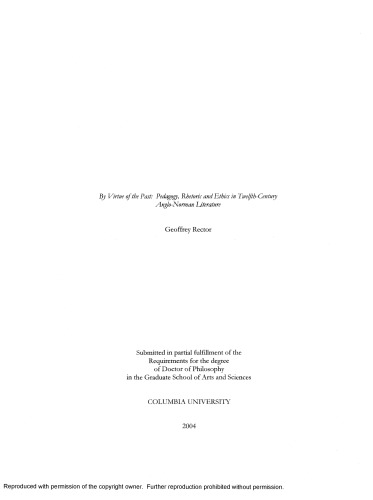Product desciption
By Virtue Of The Past Pedagogy Rhetoric And Ethics In Twelfthcentury Anglonorman Literature Geoffrey Rector by Geoffrey Rector instant download after payment.
In 12th century England, literature, as a field of cultural activity that includes reading, writing, and forms of sociability, is organized by educational practices and methods, even where no educational institution is directly involved. This dissertation investigates these conditions in the case of Anglo-Norman literature, the principal vernacular literary culture of 12th century England. In the introduction, “ L'escole des letres: Pedagogy and the field of Anglo-Norman literature,” I show that the claim, made by authors and readers, that literature is a “school of virtue” is not an empty trope of didacticism, but rather a legitimate invocation of the practices of the “school.” The larger field of 12th century English letters operates as a Scola literaria, a model that parallels Renaissance and Enlightenment notions of the Respublica literania. The school not only lends authors and readers their methods, but also their models of sociability and rhetorical influence within a larger field of public activity. The first chapter shows that the early formative period of Anglo-Norman literature is characterized by the attribution of the practices and texts of monastic study to secular, and particularly female, readers. In chapter 2, I show that the Vie de Saint Alexis was composed as an instrument of meditative study and its manuscript as a complete manual of monastic education for a particular community of religious women. This chapter develops a theme introduced in the first chapter, that the aesthetic and manuscript forms of Anglo-Norman literature evolve from pedagogical methods and intend to elicit pedagogical effects. This is developed with particular attention in chapter 3, which looks at Jordan Fantosme's use of pedagogical maxims as the principal figure of both stylistic and civic rhetoric, and chapter 4, which shows that the plot forms of Marie de France's Lais follow the central pedagogical trope of medieval historical literature: the ethical ‘recuperation’ of the lost and unfamiliar. In conclusion, I argue that Anglo-Norman's capacity to assume the social and aesthetic operations it inherits from pedagogy is predicated on its medial status between Latin, the language of high literary functions, and English, which was socially and aesthetically degraded after 1066.


